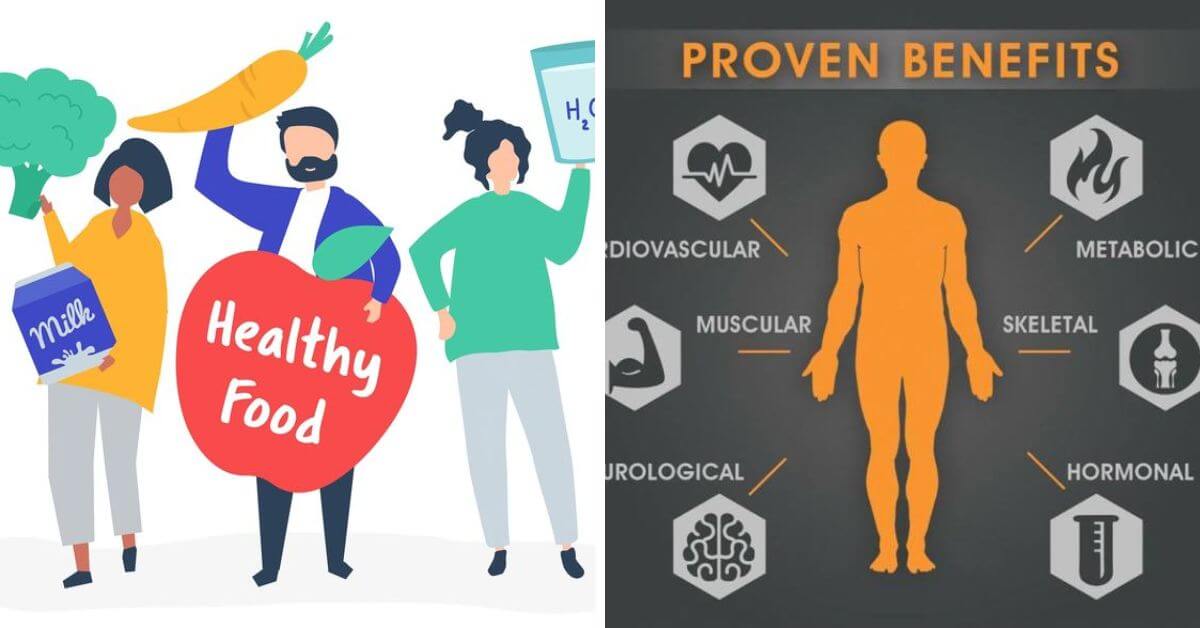Exploring the benefits of healthy eating and exercise can improve overall health and well-being.
The discussion will cover the components of a healthy diet and the advantages of regular physical activity.
Understanding how healthy eating and exercise can aid in weight loss, prevent chronic diseases, and enhance quality of life is essential.
Tips on integrating healthy habits into daily routines and dispelling common misconceptions about diet and exercise will be provided.
Let’s delve into this topic after grabbing a healthy snack!
In This Article
What is Healthy Eating and Exercise?
Proper nutrition and regular exercise are fundamental aspects of a well-rounded lifestyle that significantly contribute to overall well-being. Making thoughtful decisions regarding dietary intake and engaging in consistent physical activity can have a positive impact on health and quality of life.
Eating a diverse range of fruits, vegetables, whole grains, and lean proteins can supply vital nutrients that support the immune system, enhance energy levels, and aid in weight management. Similarly, integrating exercise into one’s routine not only enhances muscle and bone strength but also enhances cardiovascular health and cognitive function.
By emphasizing healthy lifestyle practices, individuals establish a groundwork for a more vibrant and satisfying life, reducing the likelihood of chronic illnesses and promoting longevity.
What Are the Components of a Healthy Diet?
A balanced diet consists of nutrient-rich foods that offer essential vitamins, minerals, and antioxidants necessary for optimal nutrition. It involves practicing portion control to maintain a well-rounded calorie intake and staying adequately hydrated to support bodily functions.
By including a variety of fruits, vegetables, whole grains, lean proteins, and healthy fats in meals, individuals can ensure they receive a broad spectrum of nutrients crucial for overall health and well-being.
Nutrient-dense foods not only nourish the body but also help enhance immunity, support healthy aging, and lower the risk of chronic diseases. Portion control is key for weight management and preventing overeating, while sufficient hydration aids in digestion, circulation, and regulating body temperature.
What Are the Benefits of Regular Exercise?
Regular exercise provides a variety of benefits, such as improved physical fitness, increased muscle strength, flexibility, and endurance. Participation in physical activity can enhance overall health and contribute to a more active and energetic lifestyle.
Incorporating regular exercise into a routine can not only enhance cardiovascular health but also raise metabolism, aiding in maintaining a healthy weight. Engaging in physical activity can improve mental well-being by reducing levels of stress and anxiety.
Consistent physical activity supports better sleep patterns, which can increase energy levels throughout the day, leading to improved productivity and a more positive outlook on life.
The positive impacts of exercise on overall well-being are evident.
How Does Healthy Eating and Exercise Affect Overall Health?
Proper nutrition and exercise are essential for improving overall well-being as they assist in disease prevention, support mental health, and enhance the immune system. These lifestyle choices have a significant impact on long-term health and vitality.
Regular physical activity not only aids in weight management but also reduces the risk of chronic conditions like heart disease, diabetes, and certain cancers. When paired with a balanced diet containing fruits, vegetables, lean proteins, and whole grains, the body receives essential nutrients necessary for optimal functioning.
Exercise triggers the release of endorphins, neurotransmitters that help alleviate stress and enhance mood, thereby contributing to better mental health overall.
What Are the Physical Benefits?
The physical benefits of healthy eating and exercise include improved cardiovascular health, weight management, enhanced energy levels, and a stronger immune system. These lifestyle choices contribute to overall physical well-being.
When individuals make a conscious effort to nourish their bodies with nutritious foods and engage in regular physical activity, they are not only supporting heart health but also aiding in maintaining a healthy weight. By doing so, they are providing their bodies with the tools needed to function optimally, allowing for increased energy levels and resilience against illnesses.
Incorporating a balanced diet and exercise routine into daily life can help individuals achieve long-term physical fitness goals and establish a foundation for a healthy body and mind.
What Are the Mental Benefits?
Incorporating healthy eating and exercise into one’s routine can result in significant mental benefits, such as reduced stress, improved cognitive function, emotional balance, and a strengthened mind-body connection. These lifestyle choices have a positive impact on overall well-being.
Prioritizing nutritious foods and regular physical activity not only improves physical health but also enhances mental well-being. Consuming a balanced diet rich in fruits, vegetables, whole grains, and lean proteins supplies the brain with essential nutrients for optimal functioning.
Exercise releases endorphins, the feel-good hormones, which can elevate mood and reduce feelings of anxiety or depression.
This holistic approach to wellness fosters a harmonious relationship between the body and mind, enhancing resilience to stress and promoting emotional stability.
How Do Healthy Eating and Exercise Contribute to Weight Loss?
Maintaining effective weight management involves healthy eating and exercise, impacting body composition, metabolism, and overall health. By following a balanced diet and regular physical activity, weight loss goals can be achieved.
Nutritious food choices help regulate metabolism, allowing the body to efficiently burn calories and maintain a healthy weight. Physical exercises help burn excess fat and build lean muscle mass, which aids in boosting metabolism even at rest.
The combination of healthy eating habits and a consistent workout routine not only supports weight loss but also improves overall well-being, reducing the risk of various chronic conditions.
What Are the Best Foods for Weight Loss?
When aiming for weight loss, individuals should incorporate foods with high nutritional value, practice portion control, and maintain a balanced diet. These dietary choices can effectively support weight management goals.
Opting for nutrient-dense foods such as leafy greens, lean proteins, whole grains, and fruits can offer essential vitamins, minerals, and fiber while helping to control calorie intake. By being mindful of portion sizes and avoiding large meals, individuals can more effectively regulate their caloric intake.
A balanced diet that includes a variety of food groups ensures that the body receives all necessary nutrients for optimal functioning while also aiding in weight loss.
It is important to remember that moderation is key in achieving sustainable and healthy weight management outcomes.
What Are the Most Effective Exercises for Weight Loss?
An effective weight loss regimen typically involves a combination of cardiovascular activities, strength training, and endurance exercises. Engaging in a variety of physical activities can assist individuals in reaching and maintaining their weight loss goals.
Cardiovascular activities like running, cycling, and swimming are known for their ability to burn calories and enhance heart health. Strength training exercises such as weight lifting and bodyweight exercises are beneficial for increasing muscle mass, which can subsequently boost metabolism. Endurance exercises like hiking or dancing can help improve stamina and overall fitness levels.
Incorporating a mix of these activities into a workout routine can optimize the effectiveness of weight loss efforts and provide a comprehensive approach to fitness.
What Are the Long-term Benefits of Healthy Eating and Exercise?
Adopting healthy eating habits and maintaining regular exercise routines offer long-term benefits such as improved longevity, enhanced quality of life, and better preventive care practices. These lifestyle choices contribute to overall well-being and vitality over time.
By fueling the body with nutritious foods and engaging in physical activity, essential nutrients are provided that can help ward off chronic diseases and boost the immune system. The combination of a balanced diet and consistent exercise not only strengthens physical health but also has positive effects on mental well-being, reducing stress and promoting better sleep patterns.
Long-term adherence to these habits can lead to a more energized and fulfilling life, ultimately enhancing overall health and happiness.
How Do They Help Prevent Chronic Diseases?
Healthy eating and exercise are essential factors in preventing chronic diseases by decreasing inflammation, reducing the likelihood of health conditions, and enhancing overall well-being. These lifestyle choices are fundamental components of preventive care.
Regular physical activity aids in controlling the body’s inflammatory response, which is associated with several chronic diseases like heart disease, diabetes, and cancer. Foods that are rich in antioxidants and possess anti-inflammatory properties can also help combat inflammation and bolster a healthy immune system.
Through adopting a well-rounded diet and maintaining a regular exercise regimen, individuals can greatly diminish their risk of developing long-term health problems and sustain a vibrant quality of life.
How Do They Improve Quality of Life?
Healthy eating and exercise can have a significant positive impact on quality of life by enhancing overall well-being, promoting a positive mindset, and improving mood.
These lifestyle choices play a role in creating a fulfilling and enriching life experience. Incorporating nutritious foods into one’s diet, such as fruits, vegetables, whole grains, and lean proteins, can help increase energy levels and support optimal physical health.
Similarly, engaging in regular physical activity, whether through a structured workout routine or activities like walking or swimming, not only strengthens the body but also triggers the release of endorphins, leading to improved mood and reduced stress.
Prioritizing a balanced combination of healthy eating and exercise establishes a strong foundation for sustainable well-being and overall happiness.
How Can Someone Incorporate Healthy Eating and Exercise into Their Daily Routine?
Incorporating healthy eating and exercise into one’s daily routine involves setting fitness goals, cultivating healthy habits, and embracing an active lifestyle. Making consistent efforts to prioritize nutrition and physical activity can lead to long-term well-being.
To enhance the integration of health and fitness into daily life, it is essential to create specific and achievable goals. These goals will provide a clear direction and purpose, motivating individuals to stay committed to their wellness journey.
By identifying what one wants to achieve, whether it’s improving strength, losing weight, or enhancing overall health, they can tailor their diet and exercise routine to match these objectives. It’s important to note that small, gradual changes in habits can yield significant benefits in the long run.
What Are Some Tips for Maintaining a Healthy Diet?
Maintaining a healthy diet involves prioritizing nutrition, practicing mindful eating habits, and staying hydrated throughout the day. It is essential to focus on consuming a balanced and diverse range of foods to support overall health.
Incorporating plenty of colorful fruits and vegetables into meals can provide a wide array of essential vitamins and minerals. Aim to include whole grains, lean proteins, and healthy fats in the diet to maintain energy levels and promote proper bodily function.
Avoiding excessive consumption of processed foods high in added sugars and unhealthy fats can help reduce the risk of chronic diseases. Remember to listen to the body’s hunger and fullness cues, eating slowly and savoring each bite to foster a healthier relationship with food.
What Are Some Tips for Staying Active?
Maintaining an active lifestyle requires commitment to regular exercise, engaging in a variety of physical activities, and staying motivated to prioritize fitness. It is important to include activities that improve physical endurance and support an active lifestyle.
This can involve integrating enjoyable elements into your fitness regimen such as dancing, hiking, or participating in team sports. To sustain progress, establishing specific goals for yourself, whether it involves achieving a set number of steps daily or enhancing flexibility, can aid in monitoring your advancement and increasing motivation.
Remember to pay attention to your body’s signals and include rest days to prevent exhaustion and lower the risk of injury. Keep in mind that remaining active is not only about physical benefits but also about nurturing your mental well-being through movement and exercise.
What Are Some Common Misconceptions About Healthy Eating and Exercise?
There are common misconceptions surrounding healthy eating and exercise, such as the belief that following a strict diet and intense workout plan is the only way to see results. Sustainable lifestyle changes and mindful choices can also lead to significant health benefits.
It is important to understand that adopting a balanced approach to nutrition and physical activity is key to achieving long-term health and fitness goals. Rather than focusing solely on short-term fixes, cultivating a healthy mindset that values nourishing your body with wholesome foods and engaging in activities you enjoy is crucial.
By making sustainable changes that align with your lifestyle, you can create lasting habits that support your overall well-being. Remember, it’s not just about the intensity of your workout or the restrictiveness of your diet, but about finding a harmonious balance that works for you.
Is It Necessary to Follow a Strict Diet and Exercise Plan?
While discipline and consistency play important roles in reaching fitness goals, it is not always necessary to adhere strictly to a specific diet and exercise regimen. Opting for a balanced approach that fits your preferences and lifestyle can still result in significant health advantages.
Recognizing that each person has unique requirements and situations allows individuals to customize their fitness journey to match their own pace and preferences. Striking a balance between nutritious foods and enjoyable physical activities can encourage a sustainable healthy lifestyle.
Including variety and moderation in one’s routine allows the body to obtain vital nutrients while still enjoying occasional treats. This method not only enhances overall well-being but also aids in sustaining a long-term dedication and interest in maintaining fitness.
Can You Only See Results from Intense Workouts?
Intense workouts may lead to rapid results, but sustainable progress and long-term benefits can also be achieved through consistent exercise, motivation, and performance enhancement strategies. Embracing a sustainable lifestyle and maintaining a balanced routine can help individuals reach their fitness goals.
It is important to remember that fitness is not solely about pushing oneself to the limit every day. Developing a healthy mindset and finding enjoyment in workouts can contribute to greater long-term success.
By focusing on enhancing performance, setting realistic goals, and paying attention to the body’s needs, overall fitness journey can be improved. Balancing intensity with sufficient rest and recovery plays a crucial role in both sustaining progress and preventing burnout.
Incorporating a variety of exercises, including strength training, cardio, and flexibility workouts, can help individuals avoid plateaus and stay motivated on their journey to a healthier lifestyle.







